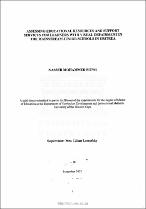| dc.description.abstract | In Eritre4 the educational resources and support services for learners with visual impairment are not adequately addressed. The department for special education needs under the MOE is disorganized, and, ill-equipped with the necessary qualified staff and material resources. Thus there is an inadequate support service, and there are not enough materials for learners as well as for their regular teachers in mainstream schools.
The aim of this study was to investigate an appropriate support system for blind and partially sighted pupils and to develop relevant skills among regular teachers in the mainstream education system. This study was conducted in three Zobas (regions) of the six administrative regions of the country. The participants involved in this study include teaching staff, pupils, parents as well as authorities of the MOE.
Both a literature review and empirical data were used in this study. ln the literature review section, the notion of inclusive education is conceptualized. The key barriers to the development of relevant support services for regular teachers and the major obstacles to strengthening the material resources for blind or partially sighted learners are discussed. Strategies to address barriers to learning and development which are used internationally and in developing countries with particular reference to the experience of South Africa
and Zimbabwe has been discussed in detail.
Qualitative research methods were employed to gain in-depth information about the teachers' and parents' attitudes towards the inclusion of blind or partially sighted learners to the mainstream schools as well as their special needs, especially with regard to material and support services in the Eritrean context. The data instruments implemented in this study are individual interviews, group interviews, class observations and document analyses. Individual interviews were conducted with regular teachers; group discussions were held with blind school teachers; and class observations were arranged for regular teachers. In addition, documents were obtained from the blind school and the Erikean National Association of the Blind (ERNAB).
The data gathered through the above instruments has been coded according to patterns or themes which emerged. The themes developed have been organized into different aspects of such topics as teachers' attitudes, insufficient educational resources, barriers to adapt
the curriculum, parents' attitudes and roles and financial constraints to enhance the inclusion of blind or partially-sighted pupils into the ordinary schools.
In general, this study provided evidence for the need for strong support for teachers in training and for establishing resource centers, equipping learners with necessary devices, involving parents in contributing to the empowerment of their children's education, as well as a need for planning to allocate a separate budget for the inclusion of such learners. | en_US |

